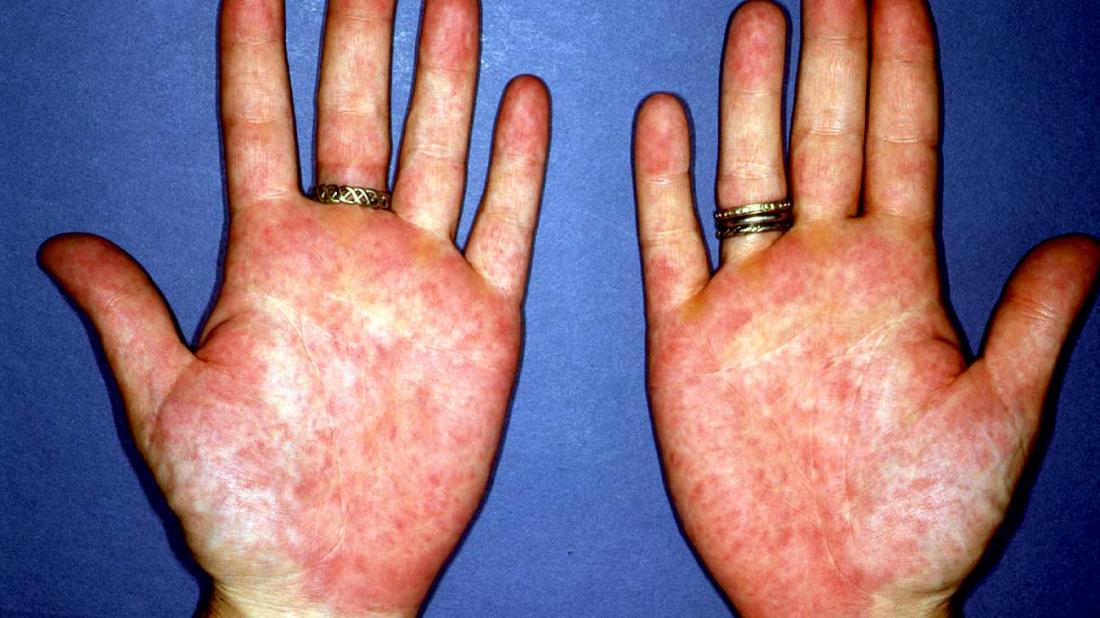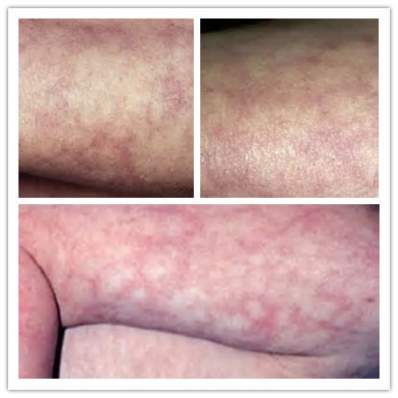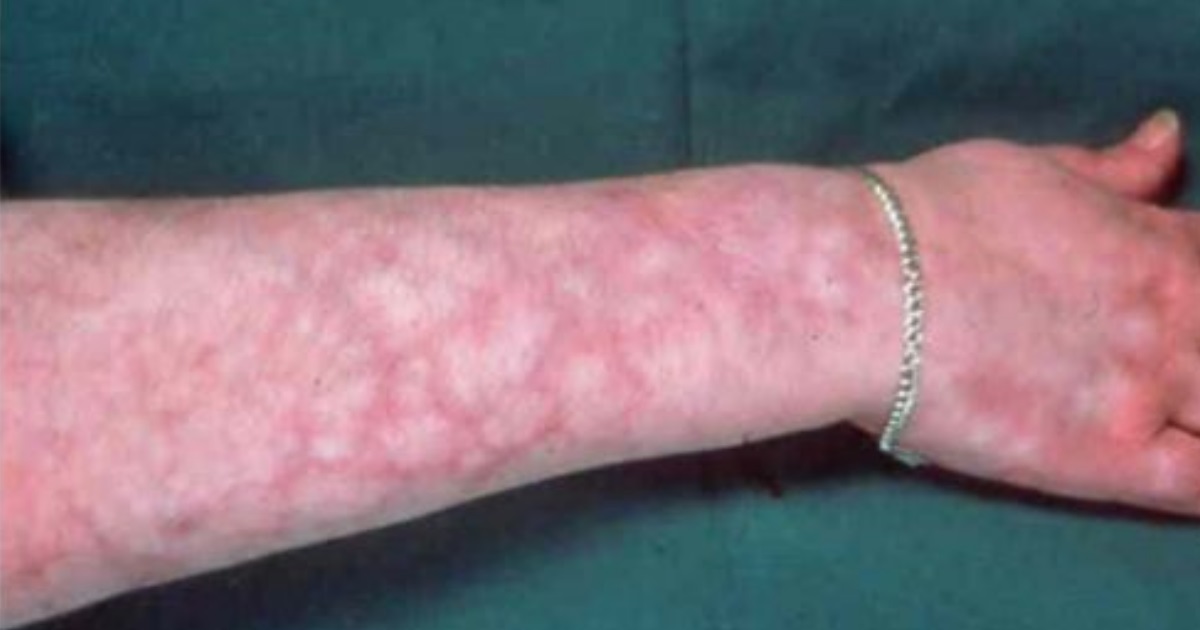A mottling skin is also called Livedo reticularis. It is the reticulated vascular pattern on the skin that may appear as lace-like purplish discoloration.
Some people believe that a mottled skin is a sign before death due severe illness such as sepsis. It may also occur due to extreme cold, affecting your legs, arms or even face.
Here are the causes babies, adults, treatment and remedies.
Mottled skin meaning (definition)
Mottling is also termed as the dyschromia or livedo reticularis in the medical terms. It is defined as a type of the patchy skin discoloration. This refers to the skin that is discolored due to the patchy appearance brought by blood vessel changes.
Other types of discoloration can either be brought about by pigment density changes or even the foreign organisms that grow on the surface of the skin, other than the vascular variations.
A skin that contains the net-like or lacy patches is said to be mottled. There is a lot of discoloration of skin that occurs in the shape of very irregular patches.
The major cause is blood vessel change, like the constriction of the blood vessels, which are very much present directly under the skin surface.
Some of the common reasons behind this include:
- Changes in the body temperature such as during extreme cold
- Blood disorders
- Excessive exposure to sun
- Use of the coagulants
- Decreased platelet count and some of the
- Medical conditions {rheumatoid arthritis and also the lupus}
When affected, the skin normally appears as the red patches that are on the arms, trunk and also the legs. A mottling skin usually turns purple in color and dark brown over some period of time.
Patches are much clearly visible on light-skinned people. In dark-skinned individuals, the patches are not as much visible but, they are equally affected.
The symptom is more evident in the cold conditions. The patient may not have any pain that is associated with the condition
Pictures
Here are pictures, images and photos showing the symptoms of this condition.

Causes
The blood vessels are tube like structures used to carry blood to and from the heart. These blood vessels can be arteries, veins and also the capillaries.
Capillaries are the tiny blood vessels that lie underneath the surface of the skin. They are much visible in most of the fair skinned individuals.
- Fluctuation in the body temperature appears to be the common cause for the skin forming dark brown patches.
- With ever-growing age, most of the people can get brown spots on the legs, arms and even face.
- Certain blood disorders may also cause irregular patches on the skin surface.
- Person who are taking anticoagulant therapy can at times find patches developing on the skin surface.
- It is also much possible amongst the people who experience low platelet count.
- Skin mottling in newborn babies can lead to a lot of distress and also the anxiety to parents. In many cases they are very much harmless and they go away as the child grows in age.
- Cutis marmorata is also another problem causing such a symptom.
- In infants and also toddler children, brown patches generally happen because of the underdeveloped vascular structure or even the circulatory system.
- To some extent, overexposure to the sun for a long period of time is also a contributing factor for adults.
Symptoms
- Appearance of lacy network of purple or even the red patches that occurs on the skin. These happen because of the constriction of the blood vessels, which usually stops the circulation of blood throughout the body. This leads to the pooling of the blood in some areas which are much close to the surface of the skin.
- The skin mottling patches are much more visible in people who have decreased skin pigmentation, because the blood vessels are normally more easily observed amongst the people who have more translucent skin. People with darker skin may not have obvious mottling patches; but, can have the same type of blood vessel changes as related to the fair skinned individuals.
- Rarely, mottling can be a sign of a very serious condition, which needs a very prompt medical attention.
If the patient has an abrupt patches together with several other symptoms, like the pain or even the breathing difficulties, then it might be that the patient is suffering from a shock.
In such cases, the patient are supposed to seek urgent medical attention.
Does mottling of skin occur before death?
According to Compassion and Support website, “Blood pressure gradually goes down and heart rate gets faster but weaker. Fingers, earlobes, lips and nail beds may look bluish or light gray. A purplish or blotchy red-blue coloring on knees and/ or feet (mottling) is a sign that death is very near.”
Mottled skin of baby
There is no any given cause for alarm if the mother gives birth to a newborn that indicates some evidence of the brown patches on the skin.
There are several natural causes for livedo leticularis in infants and also young children. Most of the cases disappear on their own without treatment.
Since dyschromia is due to blood vessel changes that are under the skin, it is important to attempt to prevent extreme cold in young children and toddlers.
The skin can be colored red, or even purple depending on the condition. These particular patches are just the blood under the skin.
Sometimes the skin on the baby’s arms and also the legs can develop a small pattern that appears like marble. This happens when the blood flow to the skin reduces.
Babies get mottled skin due to their sympathetic nervous system that isn’t regulated yet. If the baby is otherwise acting very much healthy, it should disappear in a few minutes
Dyschromia can be typically observed in the newborn infants.
- During the time of the child delivery, mottling can develop due to the broken blood vessels that are present on the upper layer of skin.
- It produces a marbled look of the skin.
- Cutis Marmorata also appears when the infant passes the stool.
- An intensely cold environment can cause this problem. This is because of dilatation of a few capillaries that are on the upper surface of skin due to the cold temperature.
- The skin changes consist of the circumscribed, pink patches that are measuring about 3 cms in diameter, which are bordered by the bluish discoloration. They normally produce a striking marble polish effect.
- Livedo leticularis in infants normally involves the trunk and also the extremities in varying degrees. The nose and also the genitalia are seldom involved.
Possible causes in toddlers
Throughout the baby’s growth and also development, parents sometimes observe skin color changes occurring on their babies.
These particular skin color changes may be described as a mottling of the purplish, and sometimes can be blue on several parts of the baby’s body.
- A change in the color of the skin is because of underdeveloped circulatory system.
- Babies normally exhibit a patchy skin because of their immature circulatory system.
- The nerve supply that is used to the fine blood vessels especially on the upper skin layer is still very much immature. This can lead to uneven contraction and also dilatation of the blood vessels on several parts of the skin.
As babies grow up, mottling should not be of worry to the parents. Normally, by this time their circulatory system is much well developed.
- During the development, parents might notice that a child’s hands as well as the feet are bluish as compared to other parts of the body.
- Parents may also see that a child is very much pink on one side and also blue on the other side.
- When kids cry, blotchiness on the skin might be exhibited.
- It also happens when the children are cold.
- These are indications of an immature circulatory system.
- A child can also feel much withdrawn and also experience low self-esteem due to the skin mottling.
- Over time, the symptoms can disappear as the circulatory system develops.
When the symptom persists, take your child to the doctor urgently.
Patchy skin on legs and arms
Livedo leticularis normally appears in the red patches that are on the trunk, arms as well as the legs, which eventually turn the color to purple and also dark brown over time.
Treatment normally centers on treating of the underlying disorder leading to the symptoms.
In some other cases, topical creams as well as the lotions may be applied. But, doctors warns that there is no treatment for the condition unless the causes are reversed.
Warming of the area might assist temporarily, but the affected blood vessels normally become dilated over time, allowing more blood to pool under the skin’s surface.
In some other cases, the brown patches on the skin can become permanent.
Treatments
Skin discoloration in which the blood vessel normally changes thus giving the skin a patchy appearance can easily be gotten rid of.
Treatment options that are available for the discoloration include topical remedies and also the laser or even the light-based methods like the chemical peeling, laser resurfacing and also the photo rejuvenation.
Some of the options can work better than others, depending on the exact cause of the skin discoloration. In addition, the effect of the treatment also much depends on the affected individual and the skin pigmentation.
This is due to the fact that lighter-skinned people usually suffer more sun damage than the darker-skinned.
- While not the typical treatment way in the sense that it does not assist to cure the condition, topical remedies are an option that a person who has mottled skin can be able to look into.
- There are lotions or even the skin dyes that normally bleach the skin, lightening it so as to disguise the discoloration of the skin.
- Cosmetics are another option that can hide mottled skin. The problem with the options, is that they do not permanently do away with the condition, and with bleaching, skin discoloration is able to reappear.
- Chemical peeling is also a procedure which improves the skin discoloration, and other skin problems, through exfoliation. An application of the chemical solution, which normally varies depending much on the given condition, is left so as to soak deep in the skin. Within a given time frame of about one day up to two weeks, the solution then peels off, thus destroying parts of the skin and then allowing the new skin to grow.
There are only three types of the chemical peels: superficial, medium and also the deep. Each type of the peel works on the skin discoloration, but the ones who are normally darker-skinned cannot receive a deep peel as it bleaches the skin.
- Laser resurfacing accompanies chemical peeling so as to achieve good results. The two procedures are almost similar as they both get rid of parts of the skin, but the laser resurfacing do not involve the chemicals. Instead, it involves the use of the lasers, either by wounding or even no wounding.
A wounding laser does away with the thin layers of the skin, while a nonwounding laser normally stimulates the growth of the collagen and also tightens the skin.
- Photo rejuvenation is a type of treatment that can assist to improve the look of the mottled skin. It is a light-based way where the strong pulses of the light penetrate the deepest layer of skin. With this given procedure, the outer layer of skin is normally not damaged like the chemical peeling or even the laser resurfacing.
Home remedies
Try these home remedies for a discolored or patchy skin.
1. Aloe Vera
Aloe vera is usually considered to be a skin friendly herb. When you use the soothing gel on to the skin, you instantly feel being cool and the itchy skin feels like it has found the right thing that can be used to treat itself.
While the aloe vera naturally protects the skin from the environmental elements such as smoke, pollutants and also the sun rays, it reduces scarring and also assists to heal cuts, and burns.
Thus, you can use the gel to the red patches on skin brought about by almost any type of factor. It can relieve redness.
Get this:
- Aloe vera gel
- A clean cotton ball
Procedure:
- Take the gel out of the container or even directly from the leaf if you have one.
- Use this on the affected skin with the assistance of cotton ball or even the fingers.
- Leave the gel on skin for some time. Though you do not require to wash it off but if you feel being sticky, then wash off using water after at least 30 minutes.
2. Baking Soda
Some skin conditions require gentle exfoliation so as do away with the mottled patches brought about by the dead skin cells. Baking soda is an excellent exfoliant that assists to open up any clogged pores and also to deeply cleanse the skin to provide a person with an even skin tone.
Required:
- Baking soda about 3 tbsp
- Water- which is enough to make paste
Procedure:
- Make a thin paste by mixing the baking soda and water.
- Use this on the skin patches.
- Scrub gently for about 30 minutes.
- Wash off using water.
- You can repeat the procedure daily or once in 3 days till you do away with the symptom.
3. Oatmeal
Oatmeal is a perfect moisturizing agent. It is able to rehydrate the extremely dry skin that is giving you skin blotches on the leg or even on face.
The compound avenanthramides which is present in the oatmeal contains an anti-inflammatory and also anti-oxidant properties also. It assists you do away with redness of the skin. If you have mottled skin all over the body, the best way would be to take oatmeal bath.
Use Oatmeal as Mask
Required:
- Oatmeal- about 2 tbsp
- Warm water- 3 tbsp
- Honey- 1/2 tsp
Do this:
- If the oats are not in the powder form, grind them so as to get a very fine powder.
- Add some water to it so as to get a paste.
- Add some honey also, if using.
- Use the mixture to the mottled patches on the skin.
- Leave it for about 15 minutes.
- Now gently massage the skin with it for about 10 minutes.
- Leave it again for 10 minutes.
- Wash off using lukewarm water.
- Repeat the process at least 4 times a week.
Oatmeal Bath
Required:
- Oat powder- 1 cup
- Lukewarm bath water
Procedure:
- Fill bath tub with enough lukewarm water.
- Add the oatmeal powder to the water and stir well so as to mix.
- Soak yourself in the water for about 20 minutes.
- Now take the shower.
- Pat the skin dry.
- Repeat the procedure about 4 times a week so as to do away with the red mottled skin.
4. Green tea
Green tea has been accepted as one of the best anti-inflammatory available ingredient. Its natural anti-inflammatory as well as the anti-oxidant properties assist you to do away with the redness and also the swelling of the mottled skin that makes you to be uncomfortable.
Get this:
- Warm water- 1 cup
- Green tea or even 1 tea bag
- Rice flour- 1 tbsp
Procedure:
- Soak the tea bag in warm water for about 15 minutes.
- Strain or even take out the tea bag.
- Add the rice flour or even the oatmeal powder if you are using to the tea and also mix to get a paste.
- If you are using the tea, then soak a washcloth in it and then place it all over face or wherever you have the problem.
- If you have made a paste through mixing of the flour, use this to the mottled skin patches just like a mask.
- In either case, leave it for about 20 minutes on the skin.
- Then wash it off using pure water.
- Repeat the procedure about 3 times a week.
5. Coconut Oil
Coconut oil contains anti-septic as well as the anti-microbial properties.
Use Plain Coconut Oil
Required:
- Coconut oil
Procedure:
- Take some amount of coconut oil and use to the skin patches.
- Rub gently for a few minutes.
- Now leave it so as to be naturally absorbed by the skin.
- Use the oil as many times as you feel it is essential to do away with the dry patchy skin.
Make Coconut oil Scrub for Mottled Skin
Required:
- Coconut oil- about 2 tbsp
- Sugar- 1 tsp
- Honey- 1 tsp
Procedure:
- Mix the oil and also the sugar and honey if you are using. Honey gives the skin with extra moisture.
- Apply it to the mottled skin.
- Scrub gently for a few minutes.
- Wash off using water.
- Repeat the procedure about 2 times a week
6. Yogurt
Yogurt contains lactic acid. This particular acid is an alpha hydroxyl acid, which is the one which is applied in several cosmetics to assist smoothen the rough, dry skin.
Required:
- Plain yogurt
Procedure:
- Use a thick layer of the plain yogurt on the skin patches.
- Leave it on skin for about 30 minutes.
- Wash off using lukewarm water.
- Repeat the procedure about 3 times a week.
Sources
- What causes livedo reticularis: http://www.mayoclinic.org/livedo-reticularis/expert-answers/faq-20057864
- Mottling: http://www.babyfaq.info/skin/mottling.php


